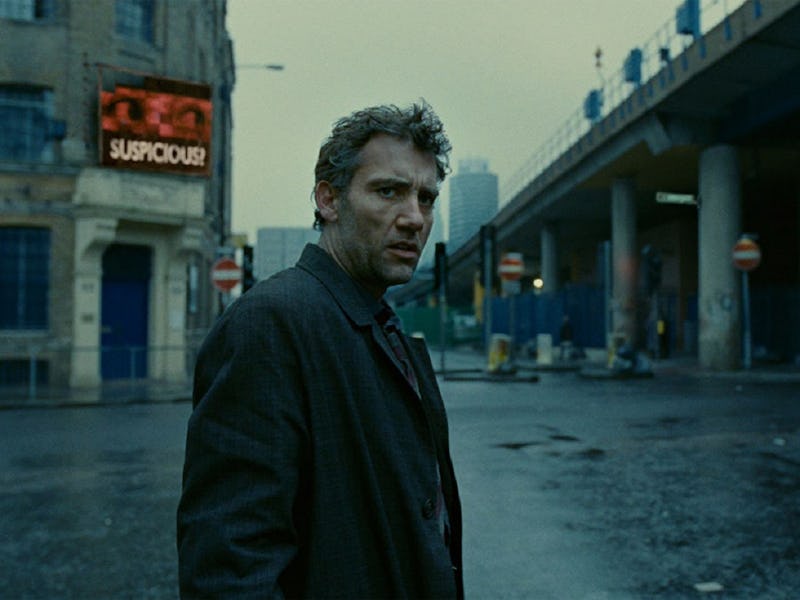15 years ago, Alfonso Cuarón perfected the modern dystopian thriller
There is no better dystopian movie than Alfonso Cuarón’s 2006 sci-fi masterpiece.

Whenever someone talks about Children of Men, they mention its opening scene. It’s not hard to see why.
Theo Faron (Clive Owen) walks into a crowded cafe, orders a coffee, and watches a news report about the death of the world’s youngest person — an 18-year-old man named Diego. The camera then follows Theo as he exits the cafe, stops on the street outside to spike his drink with some alcohol, and drops everything when the coffee shop suddenly explodes behind him.
It’s a visceral, technically impressive sequence that perfectly sets up not only the brutality of Children of Men’s world but also the tone and visual style of the film. Much has been made of the scene’s technical merits, with heavy praise usually placed on director Alfonso Cuarón and cinematographer Emmanuel Lubezki’s decision to stage Theo’s exit and the coffeeshop bombing as one unbroken take.
But not enough focus is placed on how Children of Men’s opening scene perfectly sets it up as a modern dystopian masterpiece. Cuarón and his collaborators don’t just pull the viewer into Children of Men’s world through shock and violence but also through their use of familiar locations, news stories, and current events.
Coffeeshops and terrorist attacks are, after all, two things that are uniquely familiar to citizens of the 21st century. By combining them, Children of Men immediately introduces us to a dystopia both foreign and totally familiar, making it all the more terrifying.
Children of Men premiered 15 years ago on December 25, 2006.
Children of Men’s use of well-known 20th and 21st-century iconography does not begin and end with its opening scene.
Throughout its runtime, the film goes to places that will be familiar to anyone who has paid attention to the news over the past 30 years — from abandoned schoolyards to camps where refugees and immigrants are kept in cages. Children of Men also makes excellent use of iconic 20th-century bands like The Rolling Stones and Radiohead, with songs by both groups playing in the background of crucial scenes.
Children of Men also references famous artwork, including Michelangelo’s “Pietà.” Even the cover of Pink Floyd’s 1977 album, Animals, is referenced in a shot during the film’s first act.
Children of Men’s visual homage to Pink Floyd’s Animals.
The Pink Floyd album in question.
All these visual references help ground Cuarón’s film in a world that feels undeniably familiar. We recognize the music that plays throughout it and the places it visits. And then, as all great sci-fi films should, Children of Men takes its recognizable world and filters it through one key fictional conceit. In this case, a world in which no babies have been born for 18 years.
By striving so hard to make its world familiar despite the sci-fi premise at its center, Children of Men succeeds at telling a dystopian story in a way no other 21st-century movie has. While there have been plenty of dystopian films and TV shows in the 15 years since, none of them quite work on the same level as Children of Men.
The dystopian society seen in The Hunger Games, for instance, comes across as more manufactured and fantastical than the one in Children of Men, which works precisely because of how familiar and authentic it feels. While masterful in its own right, even a film like Mad Max: Fury Road only qualifies as a dystopian thriller by technicality. The world presented in it may be a futuristic version of Earth, but the film could be set on another planet and it would still be great.
The same cannot be said for Children of Men. Cuaron’s film takes place in the future, but the story feels just as urgent now as it did when it was first released — and that’s mainly because of how believable its vision of 2027 Earth feels.
Clive Owen as Theo and Clare-Hope Ashitey as Kee in Children of Men.
Children of Men works on multiple levels — as an on-the-run thriller, engrossing action film, family drama, etc. The way in which Cuarón and everyone involved in it (especially Emmanuel Lubezki) brought it to life remains just as impressive today as it was 15 years ago.
But there have been plenty of well-made sci-fi action movies and dramas released over the past decade and a half. What makes Children of Men a masterpiece is how well it succeeds as a dystopian thriller. The film’s futuristic society is rooted in recognizable 20th and 21st-century iconography, making its themes and musings on humanity’s future land much harder.
Fifteen years later, it remains the gold standard of modern dystopian movies, and to date, no film has come close to touching its greatness.
Children of Men is streaming on Amazon Prime Video until January 1, 2022.
This article was originally published on